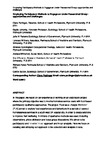Employing Participatory Methods to Engage an Under-Researched Group: opportunities and challenges
| dc.contributor.author | Pettinger, Clare | |
| dc.contributor.author | Letherby, G | |
| dc.contributor.author | Parsons, Julie Milroy | |
| dc.contributor.author | Withers, L | |
| dc.contributor.author | Cunningham, M | |
| dc.contributor.author | Whiteford, A | |
| dc.contributor.author | D'Aprano, G | |
| dc.contributor.author | Ayres, Richard | |
| dc.contributor.author | Sutton, C | |
| dc.date.accessioned | 2018-03-19T12:41:39Z | |
| dc.date.available | 2018-03-19T12:41:39Z | |
| dc.date.issued | 2018-04-29 | |
| dc.identifier.issn | 2059-7991 | |
| dc.identifier.issn | 2059-7991 | |
| dc.identifier.uri | http://hdl.handle.net/10026.1/11103 | |
| dc.description.abstract |
<jats:p>In this article, we report on our experience of working on an exploratory project where the primary objective was to involve homeless service users with food-based participatory qualitative approaches. The project FLM aimed to explore food experiences and behaviours in a sample of users of homelessness services in a south west UK coastal city, in order to create solutions to improve their wellbeing. A mixture of qualitative methods was used, including observations, photo-elicitation and focus group discussions. We aimed to be participatory and ‘creative’ in our approach and in our analysis. Here, we focus on detailing and critiquing our approach to the collection and analysis of data.</jats:p> | |
| dc.format.extent | 205979911876982-205979911876982 | |
| dc.language | en | |
| dc.language.iso | en | |
| dc.publisher | Sage | |
| dc.subject | Homelessness | |
| dc.subject | Clinical Research | |
| dc.subject | Health Services | |
| dc.title | Employing Participatory Methods to Engage an Under-Researched Group: opportunities and challenges | |
| dc.type | journal-article | |
| dc.type | Journal Article | |
| plymouth.issue | 1 | |
| plymouth.volume | 11 | |
| plymouth.publication-status | Published | |
| plymouth.journal | Methodological Innovations | |
| dc.identifier.doi | 10.1177/2059799118769820 | |
| plymouth.organisational-group | /Plymouth | |
| plymouth.organisational-group | /Plymouth/Faculty of Arts, Humanities and Business | |
| plymouth.organisational-group | /Plymouth/Faculty of Arts, Humanities and Business/School of Society and Culture | |
| plymouth.organisational-group | /Plymouth/Faculty of Health | |
| plymouth.organisational-group | /Plymouth/Faculty of Health/Peninsula Medical School | |
| plymouth.organisational-group | /Plymouth/Faculty of Health/School of Health Professions | |
| plymouth.organisational-group | /Plymouth/REF 2021 Researchers by UoA | |
| plymouth.organisational-group | /Plymouth/REF 2021 Researchers by UoA/UoA03 Allied Health Professions, Dentistry, Nursing and Pharmacy | |
| plymouth.organisational-group | /Plymouth/REF 2021 Researchers by UoA/UoA20 Social Work and Social Policy | |
| plymouth.organisational-group | /Plymouth/Research Groups | |
| plymouth.organisational-group | /Plymouth/Research Groups/Institute of Health and Community | |
| plymouth.organisational-group | /Plymouth/Users by role | |
| plymouth.organisational-group | /Plymouth/Users by role/Academics | |
| dcterms.dateAccepted | 2018-03-19 | |
| dc.identifier.eissn | 2059-7991 | |
| dc.rights.embargoperiod | Not known | |
| rioxxterms.version | Accepted Manuscript | |
| rioxxterms.versionofrecord | 10.1177/2059799118769820 | |
| rioxxterms.licenseref.uri | http://www.rioxx.net/licenses/all-rights-reserved | |
| rioxxterms.licenseref.startdate | 2018-04-29 | |
| rioxxterms.type | Journal Article/Review |


